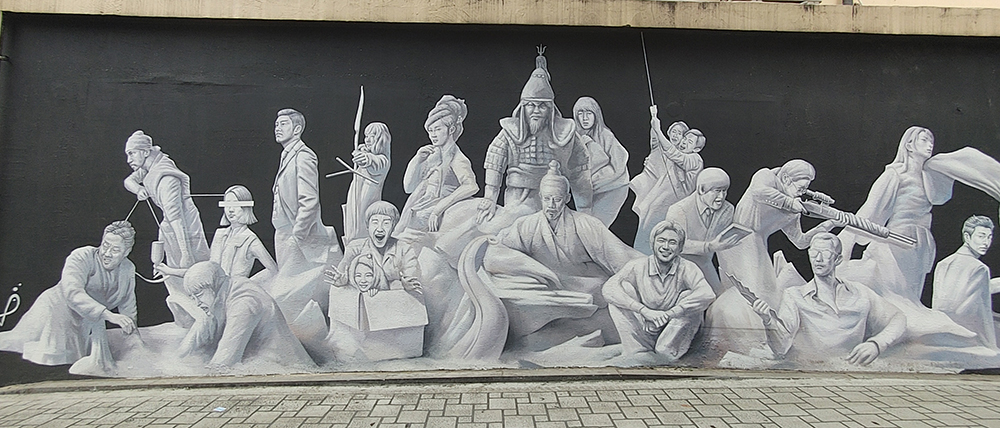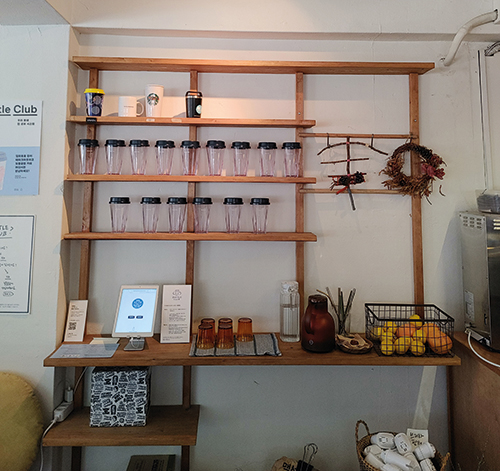The social economy brings neighborhoods back to life!
 In order to revitalize the alley business, a cooperative body drew 20 actors in Chungmu-ro. /Photography by Lee Da-young |
“Small business owners in Seoul meet the social economy!” COVID-19 has made a significant impact on our lives since the infection began in our country, including changing consumption patterns, and local businesses are experiencing economic difficulties continuously. Stores suffering from a direct hit on sales face tragic ends such as closing their business. Therefore, last November, Seoul Social Economy Center began a project with small businesses to increase their resilience to COVID-19 and spread the value of a sustainable social economy by promoting local businesses through the social economy method. This means all economic activities are carried out by social economic organizations and businesses based on cooperation and social solidarity to realize common interests and social values.
Seoul Social Economy Center and small businesses have launched an “alley commercial area activation project” based on the common goal of reviving local industry. The project is being carried out educations and campaigns with various cooperative organizations (consisting of small businesses) in Seoul.
Alley commercial area activation project, what is it?
The project was created in November 2020 by Seoul Social Economy Center and small businesses in Seoul, and the main goal is to revitalize local businesses. So far, 78 cooperative bodies from 18 districts have participated. The term “cooperative body” refers to a group of at least five small business enterprises of the same or similar type in the local area. In other words, the number of businesses that actually participated is much higher than this. These businesses are organized as cooperative bodies to convert into social and economic enterprises and jointly promote all management areas to increase their scale and competitiveness. For example, in Pil-dong, Jung-gu, there is a cooperative body called “Pil-dong Merchants Gathering” where eight restaurant businesses gathered to conduct activities such as joint Social Network Service (SNS) marketing aiming to attract new customers.
From production to promotion, we do it all together
There are three main activities of the cooperative bodies. The first one is co-production. Cooperative bodies purchase the same materials or goods together, reducing the unit price of the purchase and establishing win-win relationships. For example, merchants from Gobundari traditional market in Gangdong-gu gathered to develop lunch boxes. The second activity is joint sales, which reduces distribution costs by establishing a joint delivery or joint sales platform. The cooperative body in Gwangjin-gu created an application and experimented on walking delivery with residents.
The last type of activity is co-marketing. Co-marketing is a type of joint marketing that reduces promotional marketing costs by conducting marketing activities together and integrating regional promotional media. Many cooperative bodies make alley maps or signs and hold common markets to attract people together. Some also design a local travel package that can invigorate the local area for this time, when travel is difficult.
Other than these activities, some cooperative bodies do things to revitalize their local business. For example, a cooperative body in Jung-gu, Seoul, drew a street art in Chungmu-ro. They drew 20 actors who represents Korea with appearance in their popular movie since Chungmu-ro also refers to Korean movie.
Grow bigger with learning
Prior to the full-scale campaign, Seoul Social Economy Center also provided education for small business owners last November. First of all, they conducted a touring education program called the “Alley Academy.” The goal of this education was to convey a message of vitality through the social economy to small business owners suffering from management difficulties due to the prolonged COVID-19 crisis. The education consists of special lectures, and counseling and consulting booths. For special lectures, they could be taken on a first-come, first-served basis both online and offline, and booths were only allowed for offline participants. University professors gave the special lectures, and the topics included “commercial trends that survive the New Normal era” and “commercial analysis and pricing know-how.” Management counseling booths covered various issues such as “establishment of cooperatives and organizational transformation,” “financial counseling for small businesses,” and “consultation on food and beverage product development.”
The second educational area was “Co-prosperity as a community.” Instructors such as a representative of an organization or a cooperative gave lectures on various topics. “How local businesses could survive” or “SNS marketing strategies” are some examples. The lecture videos were uploaded to SNS so that anyone could easily see them. The following education was conducted in the same way. This education was especially for small business entrants, named “market development (or SNS marketing) for novice small business owners.” As such, rather than simply attracting people’s attention and reviving the local business for a while, they provided basic information and education to small business owners to gain a stronger foundation.
After checking your match, take your container and visit the store
The project’s first campaign began last December. The name of it was “alley signer.” It was a campaign to create a social economy through understanding and empathy signals between small business owners and local residents. To participate in the campaign, you should first enter alley commercial area activation project website. If you do a simple disposition test on the website, you can match the social enterprise that fits with you. Then, you can visit the store and attach the cheering sticker to the message board in the store.
Lee Su-bin, a resident of Seoul, left a cheering message in a bakery. She said, “I deeply sympathized with the fact that it is a really difficult time for small business owners. I have always thought I would like to deliver a simple but sincere message of support to them. So I participated and left message right after I got to know the alley signal campaign.” She also added, “Although it is only a few words, I hope that small business owners cheer up after reading a message with a sincere heart."
The next campaign was “Your Bottle Week,” which first started at Bottle Factory, a cooperative body of a cafe in Yeonhui-dong, in 2018. In January, the center and Bottle Factory launched the Your Bottle Week campaign to extend its influence from Yeonhui-dong to all over Seoul. The campaign’s goal is to encourage people to buy food and put it in their own container without using disposable products. The campaign includes intent to protect the environment, leading people’s participation to achieve the social economy at the same time.
Oh Jeong-ha, customer of Bottle Lounge (a cafe of Bottle Factory) said, “Bottle Lounge was a small cafe in quiet street but it was so amazing that a campaign to reduce disposable product has begun in this cafe. I think using our own bottle or renting one at the cafe is a good system. I hope people to find out this campaign and no more unnecessary disposable products are used.
 In order to revitalize the alley business, a cooperative body drew 20 actors in Chungmu-ro. /Photography by Lee Da-young |
Let’s get closer and listen! – Tell us about your project
Now, let’s hear from one of the cooperative bodies who participated in the project. The Dongguk Post interviewed Mapomore, a cooperatvie body of Mapo-gu, Seoul.
Q. Please introduce yourself and your business.
A: Mapomore is an organization that seeks a way with new standards through mutual cooperation in the region. It was launched with the idea that various people and communities in our local could solve problems of eating and living better lives by using our spare money on consuming and producing. It is currently active with 180 stores and 110 members.
Q. Why did you join the program?
A: Everyone is having a hard time with COVID-19, but the local businesses feel worsen. Some places cannot even open due to falling sales and COVID-19. The situation of the stores with Mapomore is similar. In these tough days, it is important to prepare for the survival of the local stores on their own, so we joined to find a way.
Q. What kind of activities did your cooperative body participate in?
A: We issue local currency that can be used only in Mapo-gu. 180 stores use this now. Through this currency, money circulates in our district, forming relationships with each other and exchanging help. We got to know each other’s power that we did not know before. We are working on a beer business that we make ourselves in the local, and we are preparing for a community alternative bank.
Q. Is there any difference working on the project as a cooperative body?
A: Through this project, we organized the contents of four alleys. We also named the alleys. One of the most necessary things is to create a joint promotion method. There would be no advance in sales right now, but I think it will be helpful in the long term. Also, getting to know each other by making alley maps and promotional materials is a great achievement.
Q. Were there any difficulties while working on the project?
A: We needed time to get to know each other and to build good relationships. It was difficult to do it within a fixed time since it was a support project. There were some restrictions due to COVID-19, too.
Q. What did you learn or feel while working on the project?
A: I have confirmed that most stores want cooperation and live hard. Although sales have decreased, we are looking for a way without losing hope. I thought it is very important how to achieve these desires and play the roles that private organizations such as Mapomore and local governments.
Q. Lastly, please feel free to say what you want to say.
A: We face this situation for the first time due to COVID-19, and I think the role of the government and local governments is important. I hope it will be an opportunity to come up with an alternative to eke out a living and what is good economy for better lives.

